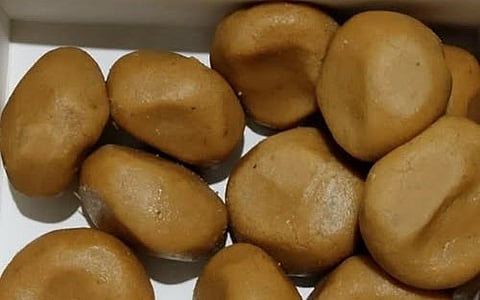
- Home
- Live Blog
- Breaking News
- Top Headlines
- Cities
- NE News
- Sentinel Media
- Sports
- Education
- Jobs

A CORRESPONDENT
BOKAKHAT: Recently, the scarcity of local cow’s milk and banana leaves from Karbi foothills has severely affected the two specialties of Bokakhat, pera and banana-leaf puri. The banana-leaf puri was also a favourite of the Late beloved Assamese artiste Zubeen Garg, who always tasted it whenever he visited Bokakhat. Similarly, Bokakhat pera is renowned for its unique taste and quality, with a reputation not only across India but also internationally. Today, the demand for this pera is still high, but due to the shortage of local milk, the quality has begun to decline.
Traditionally, the milk required to make the delicious khowa (condensed milk) for Bokakhat pera came from cows and buffaloes reared in cattle sheds across the riverine sandbars (chars) of the Brahmaputra north of Bokakhat. Milk from villages like Bhakte Chapori, Gabru Chapori, Sial Chapori, Lalung Chapori, and Upay Nopowa Chapori met the local demand. Every day, more than 500 liters of fresh local milk reached Bokakhat from these areas. Despite their struggles, the herdsmen supplying the milk never received any assistance from the Dairy Development or Animal Husbandry departments. Whenever their livestock fell ill, they had to spend their own money to bring veterinarians or field assistants to the chars.
But in recent times, the easy availability of packaged milk brands like Amul in Bokakhat has posed a serious challenge to these local milk suppliers. While milk from the chars takes time to reach the town, hotels and shops receive packaged milk early in the morning. As a result, the demand for local milk is steadily falling.
Adding to the problem, grazing grounds in the chars are shrinking. Erosion by the Brahmaputra and the conversion of grasslands into farmland for maize, beans, and other crops have reduced the pasture areas. This has not only lowered milk production but also disrupted the ecological balance of the char ecosystem. Consequently, the supply of local milk to Bokakhat has declined, and packaged milk is increasingly replacing it. Yet, the taste of khowa made from local milk is distinct from that made with packet milk. Because of these hardships faced by local herdsmen, Bokakhat pera is steadily losing its original flavour and quality. Many traders now rely on khowa from packet milk, leading to customer disappointment. Only a handful of establishments still make pera with authentic local milk.
Meanwhile, Bokakhat’s banana-leaf puri is also losing ground. The puri wrapped and served on banana leaves has a unique taste and popularity, but hotels are now struggling to source leaves. In nearby villages, local banana leaves often get shredded by monkeys or wind, forcing hotels to depend on supplies from the Karbi Anglong foothills. Traders claim that these leaves are thicker and cleaner than the local ones, and so banana leaves are brought from areas like Dolamara and Kuthori. However, reports suggest that large-scale collection of banana leaves from the hills could increase human–elephant conflict. At present, only one or two suppliers from the Kuthori area provide banana leaves to Bokakhat, but there is no certainty in the supply, leaving hoteliers frustrated.
All these factors have caused Bokakhat pera and puri to lose their former glory and taste.
Local herdsmen emphasize that to preserve Bokakhat’s pera, it is vital to protect the chars of the Brahmaputra and their grazing lands. They express anger that even after repeated appeals to the local administration and MLA, they received no support for dairy farming or milk transport. Many have now decided to abandon their traditional work.
Also Read: Big Breaking: Shyamkanu Mahanta Lands in Guwahati Amid Zubeen Garg Probe; High Security Deployed
Also Watch: